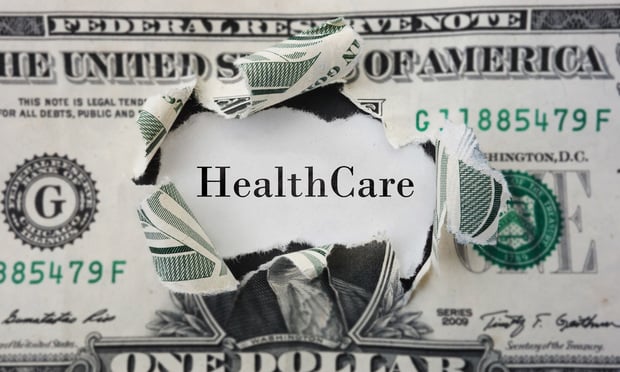 McKesson headquarters in San Francisco. Photo Credit:David Tran Photo/Shutterstock.com
McKesson headquarters in San Francisco. Photo Credit:David Tran Photo/Shutterstock.com
Pharmaceutical company McKesson Corp. and two of its subsidiariesengaged in a scheme to skim excess oncology drugs from prepackaged vials, a healthcare provider has alleged in a new complaint filed in Brooklynfederal court.
|Omni Healthcare, a Florida-based health care provider, filed thesuit on behalf of the federal government, 30 state governments, thecity governments of Chicago and New York City and the District ofColumbia.
|Related: Texas' Big Pharma troubles
|Omni seeks a $10,000 civil penalty for each violation of theFalse Claims Act, as well as treble damages. The suit also namesthe Oncology Therapeutics Network, which McKesson acquired in 2007;and US Oncology, which McKesson acquired in 2010, asdefendants.
|Omni's allegations, filed in the U.S. District Court for theEastern District of New York, are contained in a second amendedcomplaint for a lawsuit originally filed in 2012.
|The federal government opted not to pursue the aspects of thecase contained in the second amended complaint and other aspects ofthe case remain under seal, said George Carpinello of BoiesSchiller Flexner, who represents Omni.
|According to the new complaint, the UnitedStates Pharmacopeial Convention requires that thesingle-use vials of pharmaceutical drugs be slightly overfilled topermit withdrawal; many manufacturers overfill the vials, which aresubject to approval by the U.S. Food and Drug Administration, toensure that patients receive proper dosages.
|Additionally, the U.S. Centers for Medicare and MedicaidServices has made it a rule not to reimburse medical providers foroverfill.
|But from roughly 2001 to 2010, Omni alleged, the defendantsextracted the overfill from oncology drugs, repacked it anddistributed it to medical providers who then applied with thegovernment for reimbursement.
|Omni claims that it spent $3 million on oncology drugs between2007 and 2010.
|Omni alleged that one of its principals personally witnessed thescheme at work in 2007 at an Oncology Therapeutics Network drugfacility in Texas, where workers pooled overfill oncology drugs andrepackaged them, sometimes with fake product codes and expirationdates. The physicians would use the overfill and then pin the billon the government.
|“They set up a scheme to give medical providers an opportunityto charge Medicare and Medicaid for free drugs, which is illegal,”Carpinello said.
|In addition to making profit from essentially free drugs, Omnialleged, the defendant put patient safety at risk by repackagingthe oncology drugs in non-sterile syringes and in uncleanfacilities. Omni also alleged that, since the repackaged overfillwas not computed in the average sale price for the drug, thegovernment reimbursed medical providers at artificially inflatedprices.
|A spokesperson from San Francisco-based McKesson did not respondto a request for comment. The company told the trade publicationModern Healthcare, which first reported the new filing, that itis reviewing the complaint.
|In addition to Carpinello, Omni's legal team includes BoiesSchiller attorneys Courtney Rockett, Lisa Sokolowski and TeresaMonroe.
|The new complaint comes at a time of heightened scrutiny ofpharmaceutical manufacturers and distributors over pricing issuesand what role Big Pharma may have played in contributing to theopioid addiction epidemic that President Donald Trump has termed anational public health emergency.
|As Omni noted in the complaint, its new filing comes severalmonths after AmerisourceBergen Corp. pleaded guilty at theEastern District courthouse in Brooklyn to taking part in anoverfill resale scheme similar to that alleged in the complaintagainst McKesson.
|According to a release from the U.S. Department of Justice,AmerisourceBergen agreed to pay a total of $260 million in criminalpenalties and forfeiture and has also built up a $625 million reserve to settle civil claims,according to a filing with the U.S. Securities and Exchange Commission.
|In September, New York Attorney General Eric Schneidermanannounced that a coalition of 41 state attorneys general servedMcKesson and competitors AmerisourceBergen and CardinalHealth—which together manage 90 percent of the opioid distributionin the United States—with subpoenas for information about their distributionpractices.
Complete your profile to continue reading and get FREE access to BenefitsPRO, part of your ALM digital membership.
Your access to unlimited BenefitsPRO content isn’t changing.
Once you are an ALM digital member, you’ll receive:
- Critical BenefitsPRO information including cutting edge post-reform success strategies, access to educational webcasts and videos, resources from industry leaders, and informative Newsletters.
- Exclusive discounts on ALM, BenefitsPRO magazine and BenefitsPRO.com events
- Access to other award-winning ALM websites including ThinkAdvisor.com and Law.com
Already have an account? Sign In
© 2024 ALM Global, LLC, All Rights Reserved. Request academic re-use from www.copyright.com. All other uses, submit a request to [email protected]. For more information visit Asset & Logo Licensing.








